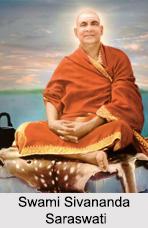 Swami Sivananda Saraswati was an exponent of Yoga and Vedanta. He is also known to be the founder of Divine Life Society located at "Muni ki Reti" in Rishikesh, Uttarakhand. Swami Sivananda Saraswati is also hailed as the inspiration behind the establishment of the Sivananda Yoga Vedanta Centers. Besides these, Swami Sivananda Saraswati has authored several books on yoga and Vedanta.
Swami Sivananda Saraswati was an exponent of Yoga and Vedanta. He is also known to be the founder of Divine Life Society located at "Muni ki Reti" in Rishikesh, Uttarakhand. Swami Sivananda Saraswati is also hailed as the inspiration behind the establishment of the Sivananda Yoga Vedanta Centers. Besides these, Swami Sivananda Saraswati has authored several books on yoga and Vedanta.
Early Life of Swami Sivananda Saraswati
Kuppuswami or Sivananda Saraswati was born on 8th September 1887 in the small village of Pattamadai (Tirunelveli district) on the banks of River Tamraparni in Tamil Nadu. His father P.S. Vengu Iyer was a Tahsildar and a great Lord Shiva devotee and his mother Parvati Ammal was a God fearing lady too. Sivananda, in his childhood, was bold, courageous, carefree and amiable by nature. An intelligent child, Kuppuswami earned prizes every year for academics. He passed his Matriculation Examination in 1903 from the Rajah"s High School, Ettiapuram. Then he joined the S.P.G. College, Trichinopoly for further education. He actively took part in college debates and dramas.
Swami Sivananda Saraswati as a Doctor
Swami Sivananda Saraswati pursued his studies in medicine at Tanjore Medical College. He earned the titles of M.B. and C.M. After passing out from the medical college, Kuppuswami practiced as a doctor at Trichy. It was during this time that he also published a medical journal called "Ambrosia".
In the year 1913, he went to Malaysia and practiced there for 10 years. Swami Sivananda Saraswati, as a doctor, treated the downtrodden and ran a hospital there. Often he would treat the poor without taking any fees from them. During his stay in Malaysia, he published some medical books such as "Household Remedies", "Fruits and Health", "Diseases and their Tamil Terms", "Obstetric Ready-Reckoner" and "Fourteen Lectures on Public Health".
Swami Sivananda Saraswati as a Sage
Spiritual by nature, he had read the Hindu epics, Mahabharata and Ramayana; the Bhagawad Gita and other sacred scriptures. He also participated in Nandan Charitam and sang bhajans. However, after a brief encounter with an itinerant sage led Swami Sivananda Saraswati to find out the ways to heal people spiritually. To find such a path he returned back to India in 1924. On the 8th of May, 1924 Kuppuswami reached Rishikesh. He was rechristened as "Swami Sivananda" by Guru Vishwananda Saraswati and he started staying in the Swarga Ashram for performing meditations and Tapas and Japas.
 Swami Sivananda renounced the worldly pleasures and lived to serve humanity. He resided in a small dilapidated kutir. In that kutir he would perform intense Tapas and meditation, and sometimes he would fast too, for several days. He would perform intense meditation in the early winter mornings standing tall in the River Ganga. With this intense meditation, he did not neglect his responsibilities of being a doctor and serving the sick and old; he would visit the huts of the saints carrying medicines for them. He treated the cases of cholera and smallpox. Sometimes he washed their Kutirs in case of their illness, begged on behalf of them and fed them with his own hands. Swamiji studied the scriptures and performed varied forms of yoga.
Swami Sivananda renounced the worldly pleasures and lived to serve humanity. He resided in a small dilapidated kutir. In that kutir he would perform intense Tapas and meditation, and sometimes he would fast too, for several days. He would perform intense meditation in the early winter mornings standing tall in the River Ganga. With this intense meditation, he did not neglect his responsibilities of being a doctor and serving the sick and old; he would visit the huts of the saints carrying medicines for them. He treated the cases of cholera and smallpox. Sometimes he washed their Kutirs in case of their illness, begged on behalf of them and fed them with his own hands. Swamiji studied the scriptures and performed varied forms of yoga.
Philosophy of Swami Sivananda Saraswati
The preaching of Sivananda Saraswati stressed on leading a good life by following certain norms like feelings of Maitri (friendship), Karuna (kind-heartedness), Daya (mercy), Prema (love), Kshama (Forgiveness). Serving fellow human beings should be the primary aim of a person. He also says that develop good manners, extreme politeness, courtesy, etiquette, good demeanour, nobility, gentleness, mildness should be inculcated in every person. One must abstain from taking revenge, hatred, bear insult or injury and envy and dislikes for anything or being must be removed through love and Vichara (thoughts).
Divine Life Society, Rishikesh
The Divine Life Society was established by Swami Sivananda Saraswati in 1936. This organisation developed around the same kutir that was built by Swamiji by Ganga and served the needy. His disciples also lived by his side and most of the times; they had to face a number of hardships. Hence, proper living space was also desired to accommodate his growing number of followers. The ruler of Tehri-Garhwal granted a piece of land for building Divine Life Society. The main aim of this society was to spread spiritual knowledge through pamphlets, conferences, books, magazines and satsangs. Subsequently about 300 branches were opened in all important cities. It also functioned as a charitable organisation, training centre for yoga and upheld the traditions and culture of India. Sivananda Ashram is its headquarters.
Works of Swami Sivananda Saraswati
Sivananda Saraswati, besides being an Indian saint, was an author too. He has written several books on yoga and Hindu religion. Some of his books include "Autobiography of Swami Sivananda", "Yoga of Synthesis", "Lord Shanmukha and His Worship", "Practice of Yoga", "Lord Siva and His Worship", "Karma Yoga", "Brihadaranyaka Upanishad", etc.
Swami Sivananda Saraswati travelled throughout India during his Parivrajaka life. He visited many prominent places of pilgrimage in India. He conducted Sankirtan and gave lectures. On 14th of July 1963, this sacred soul entered Mahasamadhi in his kutir on the banks of Ganga River in Sivanandanagar.









